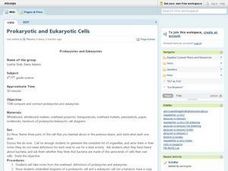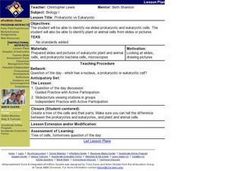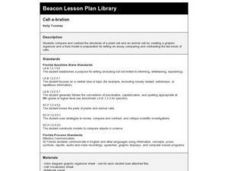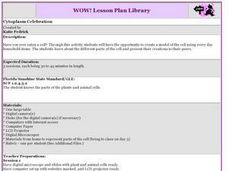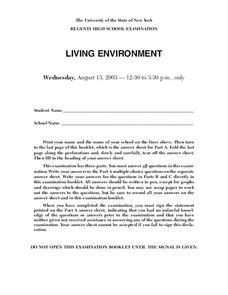Curated OER
A Cell Is Like A City
Students create analogies that help them remember the cell parts as well as their respective functions.
Curated OER
How Can We Study the Differences in Animal and Plant Cells Using the Compound Microscope?
Students examine their cheek cells with a compound microscope. They identify different parts of the cell. They compare and contrast animal and plant cells with the microscope as well.
Curated OER
Those Cells Look Good Enough to Eat
Students explore the parts of the cell. For this cell lesson, students use foods to create cell models that represent the nucleus, cytoplasm, cell membrane, mitochondria, ribosomes, vacuoles, endoplasmic reticulum, and Golgi bodies...
Curated OER
Prokaryotic and Eukaryotic Cells
Students compare and contrast prokaryotes and eukaryotes. They name the organelles that are present in prokaryotes only and identify their functions. Students label the diagrams of the prokaryotic cell and the eukaryotic cell.
Curated OER
Plant Parts
In this plant parts worksheet, students read for information and demonstrate comprehension. In this true and false, fill in the blank, short answer, and multiple choice worksheet, students answer ten questions.
Curated OER
The World of Living Things
The World of Living Things is the focus of this biology presentation. Students view a presentation which introduces them to cells, parts of cells, microorganisms, and simple vs. complex animals. They see that they are classified as a...
Biology Corner
Cell Theory Rap
All that this will link you to is a rap about cell theory and organelles. Use it as an example for a creative assignment in your biology class. Divide the class into groups and assign them a topic for which they write and perform a skit,...
Concord Consortium
Aquapores
Aquapores allow water to travel through cell membranes while keeping other molecules out. The animation offers an up-close look at these parts of the cell membrane. It explores multiple vantage points and shows the importance of these...
Curated OER
Biology: Make a Model Cell
Students compare and contrast plant and animal cells and then create a model of the latter. They visit Websites to view the cells and answer questions about them. In pairs, students create cell models using plastic baggies, syrup,...
Curated OER
The Great Archeological Dig
Students explore biology by identifying a diagram. In this cell anatomy lesson, students read a story about archeology and conduct a fictitious archeology dig in class in which they search for animal cells. Students define a list of...
Curated OER
Prokaryotic vs Eukaryotic
Students identify via slides prokaryotic and eukaryotic cells. They identify plant or animal cells from slides or pictures. Students are given the question of the day. They are asked which has a nucleus, a prokaryotic or eukaryotic...
Curated OER
Seeing Cells
Sixth graders study living cells and their functioning units. In this cell lesson students color cell diagrams, answer questions and discuss the differences between plant and animal cells.
Curated OER
Cells
In this biology activity, students use the clues given at the bottom of the sheet to complete the crossword puzzle on cells. There are 22 clues to solve in the puzzle on cells.
Curated OER
Cell Cookies
Fifth graders, in groups, create a plant or animal cell out of cookies, frosting, and candy pieces.
Curated OER
Cell-a-bration
Fifth graders study the structures of a plant cell and animal cell. They create a graphic organizer and a food model. Finally, they write an essay comparing and contrasting plant and animal cells.
Curated OER
Cytoplasm Celebration
Young scholars create a model of a cell using everyday household items. They view digital microscope images of cells and cell parts, watch an online video, create a cell model out of household images, and record their presentation using...
Casimir Middle School
Biological Classification Worksheet
Classify living things with a set of worksheets that has pupils sorting and indentifying living and non-living things. Learners use the worksheets as a basis for finding their answers.
Curated OER
Living Environment
In this environmental instructional activity students complete a series of multiple choice and short answer questions on animal populations, cell structure and chromosomes.
Curated OER
Living Environment
In this environment worksheet students complete a series of multiple choice questions and short answers on plant and animal species and populations in an ecosystem.
Serendip
Introduction to Osmosis
A chicken egg is a very large cell—perfect for investigating osmosis! Scholars conduct an experiment with vinegar and eggs that helps them understand the process of osmosis. They follow the activity with an in-depth look at osmosis in...
Curated OER
The Cell Theory
In this cells worksheet, students review how the cell theory was developed. Students review the structure and function of cell structures and active transport. This worksheet has 30 fill in the blank questions.
Curated OER
Cell Community
Seventh graders use technology to review cell structure and function. In this cells less, 7th graders review the parts and functions of a cell, and use photography/video and PowerPoint to enhance their explorations.
Curated OER
The Giant Cell
After actively participating in a unit on cells, the students act out and become the organelles. They will act out and explain the functions of what each of the organelles do for the cell.





